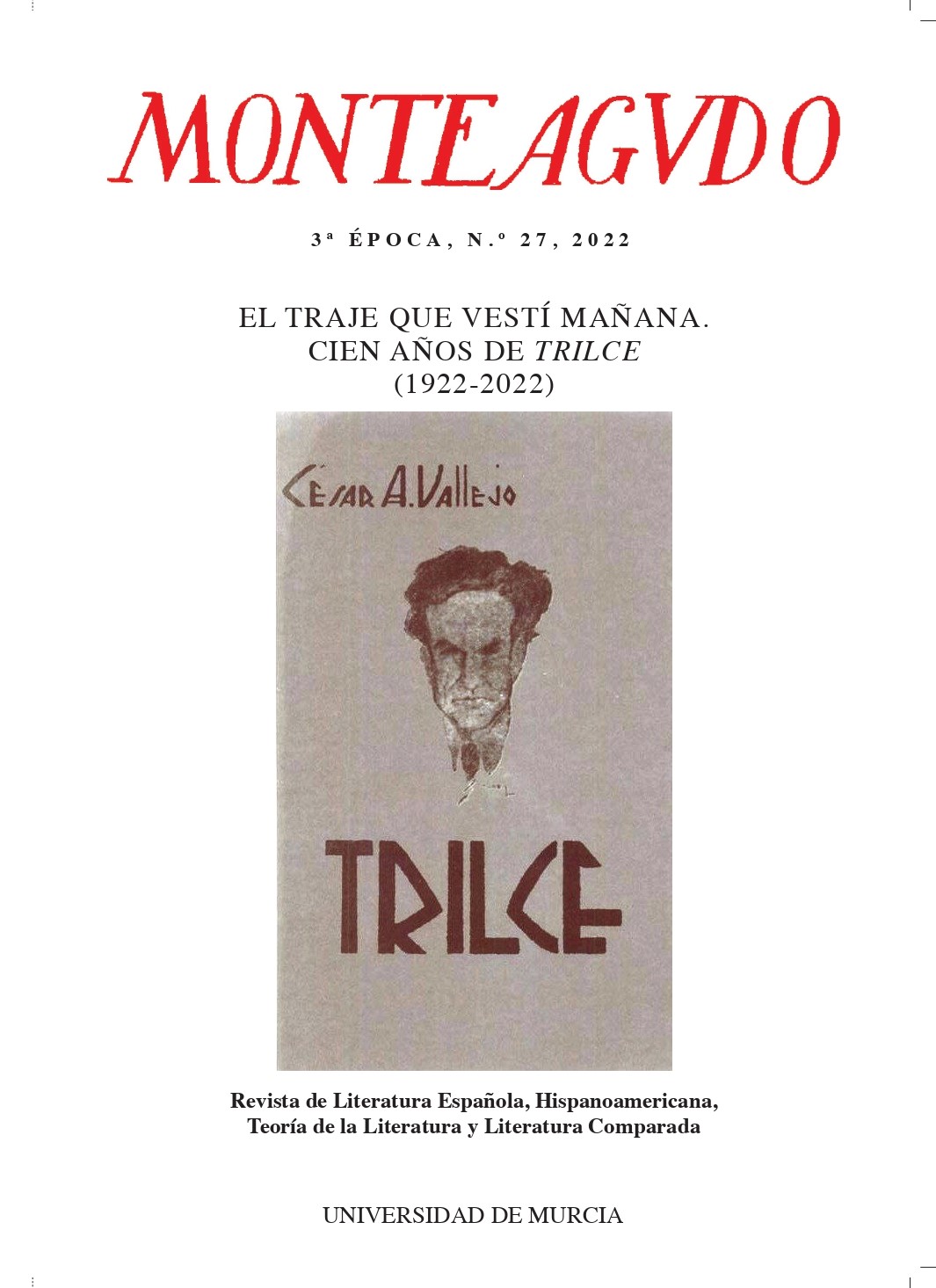Intertextuality and perception of recent history: El rey recibe (2018) by Eduardo Mendoza
Supporting Agencies
- Double-Coding, Intertextuality, Faction, Contemporary Spanish novel, History, Eduardo Mendoza
Abstract
El Rey Recibe presents, under a layer of apparent simplicity, a double coding made of 49 intertextual quotations, -literary, from historians, psychiatrists, reverends, carols, magazines and from posters- which complement the text. They remind us of the hybrid nature of the novel whilst inviting us to unmask the apparent objectivity of historical discourse and to explore the problematic nature of knowledge. The aim of this article is to analyze the role of these quotations as pieces of a textual collage which questions what we think to know about the Spanish Transition. In the process, the reader is prompted to approach this “faction”, a mixture of “fiction” and “facts” with new eyes.
Downloads
-
Abstract413
-
PDF (Español (España))722
References
Anónimo (1970). “Amnistia total: per Nadal tots a casa”. Col·lecció MACBA, Centre d’Estudis i Documentació. Recuperado de: https://www.macba.cat/es/a02271 (último acceso: 21/01/2019).
Anónimo (s. XVI). Epístola moral a Fabio. Recuperado de: https://www.rae.es/sites/default/files/hojear_epistola_moral_a_fabio.pdf (último acceso: 21/01/2019).
Azor, 1932-1934, 1942-1944, 1961-1973. En Payne, Stanley G. (1999). Fascism in Spain, 1923–1977. Madison, University of Wisconsin Press.
Baroja, Pío (1908). La dama errante. Espasa Calpe, Madrid.
Barthelme, Donald (2005). “The Flight of Pigeons from the Palace”. Forty Stories. Londres, Penguin Random House.
Barthes, Roland (1967). “Le Discours de l’histoire”. Social Science Information, 6, 4, 65-75.
Baudelaire, Charles (2011). “Bénédiction” (Bendición). Fleurs du Mal. Las flores del mal. Madrid, Alianza Editorial.
Berlioz, Héctor (1986 [1803-1869]). “Les nuits d’été” (Las noches de estío). Texto de Teófilo Gautier (1811-1872). Library of Congress, EEUU.
Boswell, James (2008 [1791]). The Life of Samuel Johnson. Londres, Penguin Classics.
Burroughs, Edgar Rice (1912). Tarzan of the Apes. Recuperado de: http://gutenberg.net.au/ebooks/fr009616.html (último acceso: 11/12/2018).
Carroll, Lewis (2015 [1865]). Alice’s Adventures in Wonderland. Londres, MacMillan Children’s Books.
Chandler, Raymond (1988 [1942]). The High Window. New York, Vintage Crime/Black Lizard.
Certeau, Michel de (1988). The Writing of History. Traducción de Tom Conley. New York, Columbia UP.
Cercas, Javier (2016). El punto ciego. Las conferencias Weidenfeld 2015. Londres, Literatura Random House.
Costa i Llobera, Miquel (1885). Poesies. s. l. Recuperado de: https://lletra.uoc.edu/es/autor/miquel-costa-i-llobera (último acceso: 11/12/2018).
Cruz, Juan (2018). “Entrevista completa a Eduardo Mendoza: “¿Qué hacer con el Valle de los Caídos? Nada, dejarlo ahí”. El país”. Recuperado de: https://elpais.com/cultura/2018/09/05/actualidad/1536173153_630380 (último acceso: 11/12/2018).
Dickens, Charles (1852-53). Bleak House. Londres, Bradbury & Evans.
Dostoiewski, Fedor (1866). Crimen y Castigo. Recuperado de: http://www.ataun.net/bibliotecagratuita/Cl%C3%A1sicos%20en%20Espa%C3%B1ol/Fedor%20Dostoiewski/Crimen%20y%20castigo.pdf (último acceso: 21/02/ 2019).
Eco, Umberto (2008). “Confessions of a Young Novelist”. Richard Ellman Lecture Series in Modern Literature. Atlanta, Emory University.
Eliot, T. S. (1915). “Portrait of a Lady”. Others: A Magazine of the New Verse. New York. Recuperado de: https://www.poetryfoundation.org/poems/44213/portraitof-a-lady-56d22338932de (último acceso: 21/02/2019).
Emerson, Ralph Waldo (1841). “Self-reliance”. Essays: First Series. s.l. Recuperado de: www.emersoncentral.com (último acceso: 21/02/2019).
Foucault, Michel (1970). The Order of Things. An Archeology of the Human Sciences. Londres, Tavistock Publications.
Freud, Sigmund (1930). Civilization and its discontents. S.E. 21.
Greene, Graham (1932). Orient Express (Stamboul Train). Boston, Heinemann.
Haggard, H. Rider (2004 [1885]). King Solomon’s Mines. Londres, Penguin Random House.
Haggard, H. Rider (2006 [1886-87]). She: A History of Adventure. Londres, Broadview Press.
Harvey, David (1989). The Urban Experience. Baltimore, Johns Hopkins UP.
Heródoto (2000). Historia. Obra completa. Madrid, Gredos.
Iglesias Cano, María del Carmen (2002). “De historia y de literatura como elementos de ficción”, Discurso leído el día 30 de septiembre de 2002, en su recepción pública, por la Excma. Sra. doña Carmen Iglesias y contestación del Excmo. Sr. don Ángel Martín Municio. Madrid, Real Academia Española.
Ionesco, Eugène (1962), Le roi se meurt. París, L’Alliance française.
Joyce, James (1914). Dubliners. Delaware, Prestwick House Literary Touchstone Classics.
Leblanc, Maurice (1907). Arsène Lupin gentleman-cambrioleur. París, Éditions Pierre Lafitte.
Lévi-Strauss, Claude (1966). The Savage Mind. Londres, Weidenfeld & Nicolson.
Maréchal, Joseph (1923). Le point de départ de la métaphysique: leçons sur le développement historique et théorique du problème de la connaissance. Nabu Press. Recuperado de: https://openlibrary.org/publishers/Nabu_Press (último acceso: 11/12/2018).
Marías, Javier (1989). Todas las almas. Madrid, Anagrama.
Mendoza, Eduardo (2018). El rey recibe. Barcelona, Seix Barral.
Molière (1666). Le Misanthrope. París, Théâtre du Palais-Royal.
Montaigne, Michel de (1580). Essais. París, Jean Richer.
Montesquieu, Charles-Louis de Secondat (1820). Œuvres complètes. París, Laboulaye.
Nietzsche, Frederic (2005). Ecce Homo. Londres, Penguin Classics.
Ramón García, Emilio (2007). De las olimpiadas de Barcelona a la ley de la memoria histórica: La re-visión de la historia en la novela histórica española. Murcia, Nausícaä.
Riley, Clayton (1975). “The golden gospel of Reverend Ike”, The New York Times. Recuperado de: https://www.nytimes.com/1975/03/09/archives/the-golden-gospel-of-reverend-ike-revike.html (último acceso: 21/02/2019).
Rimbaud, Arthur (1895). “Ma Bohême”. Poésies complètes. París, L. Vaniers.
Rulfo, Juan (1955). Pedro Páramo. México D. F., Fondo de Cultura Económica.
Sahagún, Fray Bernardino de (1569). Historia General de las cosas de Nueva España. s.l. Recuperado de: https://sede.educacion.gob.es/publiventa/PdfServlet?pdf=VP14364C.pdf&area=C (último acceso: 21/02/2019).
Sterne, Laurence (1940). The Life and Opinions of Tristram Shandy, Gentleman.
New York, James Aiken Work.
Stevenson, Robert Louis (1886). The Strange case of Dr. Jekyll and Mr. Hyde. Londres, Longmans, Green& Co.
Ubidia. Abdón (1979). Ciudad de invierno. Quito, Editorial El Conejo.
Unamuno, Miguel de (2016 [1931]). San Manuel Bueno, mártir. Madrid, Verbum.
Valle-Inclán, Ramón M.ª del (1920). Luces de Bohemia. Madrid, Imprenta Cervantina.
Valle-Inclán, Ramón M.ª del (2017 [1932]). “Baza de espadas. Vísperas septembrinas”. El ruedo ibérico. Madrid, Cátedra.
Williams, Tennessee (2009 [1958]). Suddenly Last Summer and Other Plays. Londres, Penguin Modern Classics.
White, Hayden (1985). Metahistory: The Historical Imagination in the Nineteenth-Century Europe. Baltimore, The Johns Hopkins UP.
The works published in this journal are subject to the following terms:
- The Publications Service of the University of Murcia (the publisher) retains the property rights (copyright) of the published works, and encourages and allows their reuse under the license of use indicated in point 2.
© Publications Service, University of Murcia, 2011
- The works are published in the electronic edition of the journal under a Creative Commons Attribution-NonCommercial-NoDerivatives 3.0 Spain license (legal text). They may be copied, used, distributed, transmitted and publicly displayed, provided that: i) the authorship and the original source of their publication (journal, publisher and URL of the work) are cited; ii) they are not used for commercial purposes; iii) the existence and specifications of this license of use are mentioned.







